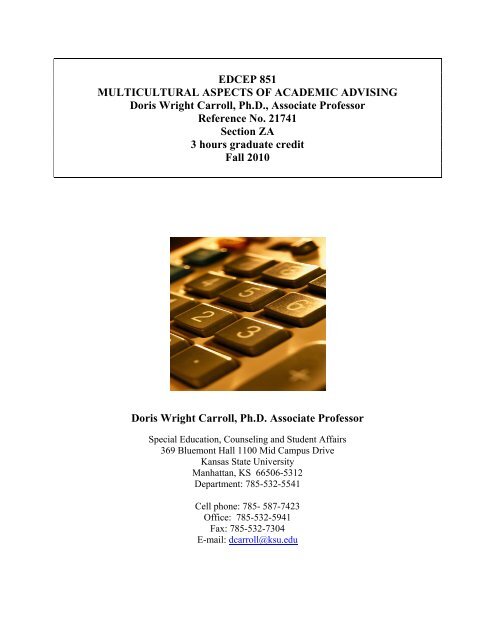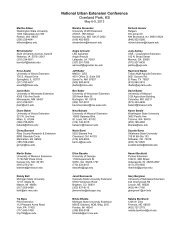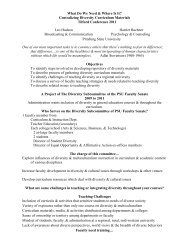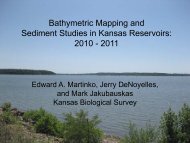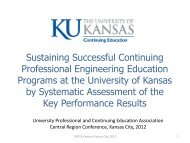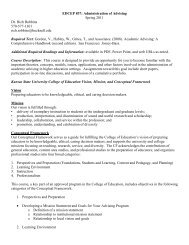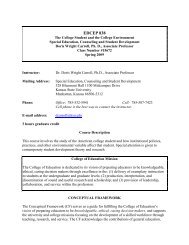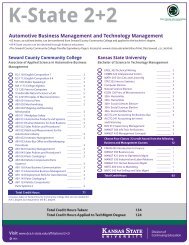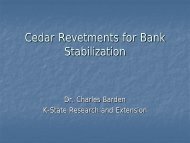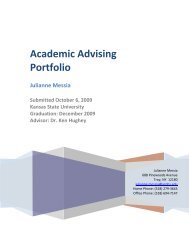Syllabus Sample - Division of Continuing Education - Kansas State ...
Syllabus Sample - Division of Continuing Education - Kansas State ...
Syllabus Sample - Division of Continuing Education - Kansas State ...
You also want an ePaper? Increase the reach of your titles
YUMPU automatically turns print PDFs into web optimized ePapers that Google loves.
EDCEP 851<br />
MULTICULTURAL ASPECTS OF ACADEMIC ADVISING<br />
Doris Wright Carroll, Ph.D., Associate Pr<strong>of</strong>essor<br />
Reference No. 21741<br />
Section ZA<br />
3 hours graduate credit<br />
Fall 2010<br />
Doris Wright Carroll, Ph.D. Associate Pr<strong>of</strong>essor<br />
Special <strong>Education</strong>, Counseling and Student Affairs<br />
369 Bluemont Hall 1100 Mid Campus Drive<br />
<strong>Kansas</strong> <strong>State</strong> University<br />
Manhattan, KS 66506-5312<br />
Department: 785-532-5541<br />
Cell phone: 785- 587-7423<br />
Office: 785-532-5941<br />
Fax: 785-532-7304<br />
E-mail: dcarroll@ksu.edu
2<br />
TABLE OF CONTENTS<br />
Pr<strong>of</strong>essor Contact Information ……………………………………………………….. 4<br />
Course Description ……………………………………………………………………. 4<br />
Mission <strong>State</strong>ment …………………………………………………………………….. 4<br />
COE Conceptual Framework …………………………………………………………. 4<br />
Student Learning Outcomes ………………………………………………………….. 4-5<br />
Course Objectives ……………………………………………………………………. 5<br />
Textbooks ……………………………………………………………………………. 5<br />
Technology Requirements …………………………………………………………... 6<br />
Accommodation for Disabilities …………………………………………………….. 6<br />
Campus Safety <strong>State</strong>ment …………………………………………………………… 6<br />
Expectations for Online Class Conduct …………………………………………….. 6<br />
Academic Dishonesty ……………………………………………………………….. 7<br />
Course Requirements ………………………………………………………………... 7-12<br />
Student Group Assignments ………………………………………………… 7<br />
Main and Small Group Message Boards …………………………………… 7-8<br />
Online Discussion ……………………………………………………….. 8, 14-16<br />
Content Assessment ……………………………………………… 15<br />
Online Participation…………………………………………………. 16<br />
Online Expression…………………………………………………. 17<br />
Multicultural Advising Team Project ……………………………………… 8
3<br />
TABLE OF CONTENTS<br />
Multicultural Advising Portfolio …………………………………………………... 9, 11-14<br />
Extra Credit ………………………………………………………………………… 8<br />
<strong>Syllabus</strong> Orientation Quiz………………………………………….. 8<br />
Individual Activities ……………………………………………….. 8<br />
Grading Scale and Assessment <strong>of</strong> Learning ……………………………………… 9<br />
Security and Virus Protections …………………………………………………… 9-10<br />
Privacy and Online Communication ……………………………………………… 9<br />
Copyright Information ……………………………………………………………. 9<br />
Readings and Scheduled Activities ………………………………………………. 18-23
4<br />
EDCEP 851 MULTICULTURAL ASPECTS OF ACADEMIC ADVISING<br />
Doris Wright Carroll, Ph.D., Associate Pr<strong>of</strong>essor<br />
Reference No. 21741<br />
3 hours graduate credit<br />
FALL 2010<br />
Address: Doris Wright Carroll, Ph.D. Associate Pr<strong>of</strong>essor<br />
Special <strong>Education</strong>, Counseling and Student Affairs<br />
369 Bluemont Hall 1100 Mid Campus Drive<br />
<strong>Kansas</strong> <strong>State</strong> University<br />
Manhattan, KS 66506-5312<br />
Department: 785-532-5541<br />
Office Hours: By appointment<br />
Office: 785-532-5941<br />
online or by phone<br />
Cell phone: 785- 587-7423<br />
Preferred method <strong>of</strong> contact Fax: 785-532-7304<br />
E-mail: dcarroll@ksu.edu<br />
Course Description. This course introduces students to the various cultural, ethnic, racial, and<br />
linguistic issues associated with advising practice.<br />
College <strong>of</strong> <strong>Education</strong> Mission <strong>State</strong>ment<br />
The College <strong>of</strong> <strong>Education</strong> is dedicated to preparing educators to be knowledgeable, ethical,<br />
caring decision makers through excellence in the: 1) delivery <strong>of</strong> exemplary instruction to<br />
students at the undergraduate and graduate levels; 2) production, interpretation; and 3)<br />
dissemination <strong>of</strong> sound and useful research and scholarship.<br />
Conceptual Framework<br />
The Conceptual Framework (CF) serves as a guide for fulfilling the College <strong>of</strong> <strong>Education</strong>’s<br />
vision <strong>of</strong> preparing educators to be knowledgeable, ethical, caring decision makers, and<br />
supports the university and college missions focusing on the development <strong>of</strong> a skilled workforce<br />
through teaching, research, and service. The CF acknowledges the contributions <strong>of</strong> general<br />
education, content area studies, and pr<strong>of</strong>essional studies to the preparation <strong>of</strong> educators, and<br />
organizes pr<strong>of</strong>essional studies into four broad categories: (1) Perspectives and Preparation; (2)<br />
Learning Environment; (3) Instruction; and (4) Pr<strong>of</strong>essionalism. This course, as a key part <strong>of</strong> an<br />
approved program in the College <strong>of</strong> <strong>Education</strong>, includes objectives in the following categories <strong>of</strong><br />
the Conceptual Framework.<br />
Student Learning Outcomes<br />
This course is designed to meet the student learning outcomes (SLOS) for the Master’s Degree<br />
in Academic Advising. Course objectives listed below are derived and assessed within the<br />
context <strong>of</strong> these four student-learning outcomes.
5<br />
1. Apply advising strategies to institutional advising programs and individual advising.<br />
2. Apply theories <strong>of</strong> learning, student development, and career development to assist<br />
students with their academic and career planning.<br />
3. Understand the influence <strong>of</strong> multicultural factors on the advising relationship and the<br />
content <strong>of</strong> advising with students.<br />
4. Apply knowledge <strong>of</strong> the needs and characteristics <strong>of</strong> specific groups <strong>of</strong> students and<br />
apply to academic advising.<br />
Course Objectives: By the completion <strong>of</strong> this course, students will be able to demonstrate<br />
competencies in the following content areas.<br />
A. Perspectives and Preparation<br />
1. Recognize institutional bias and understand its impact on advising.<br />
2. Recognize the systematic, cultural biases within instruction and teaching.<br />
3. Recognize the influence <strong>of</strong> privilege in advising activities.<br />
B. Learning Environment<br />
1. Recognize the cultural learning embedded within advising activities.<br />
2. Recognize unique learning needs <strong>of</strong> each American socio-racial cultural group.<br />
3. Recognize the cultural interpersonal barriers to advising.<br />
4. Recognize the socio-political environmental barriers to advising.<br />
C Instruction<br />
1. Understand racial identity theories within advising contexts and settings.<br />
2 Recognize the cultural limitations <strong>of</strong> existing advising models and approaches.<br />
3 Recognize culturally appropriate advising interventions.<br />
D. Pr<strong>of</strong>essionalism<br />
1 Understand the cultural elements into advising practice.<br />
2 Recognize advising ethics and standards <strong>of</strong> practice.<br />
3 Recognize multicultural advising competencies.<br />
Required Textbooks.<br />
Huff, L. & Jordan, P. (Eds. (2007). Advising Special Populations: Adult learners, community<br />
college students, LGBTQ students, multicultural students, students on probation, undecided<br />
students. Monograph Series, No. 17. Manhattan, <strong>Kansas</strong>: National Academic Advising<br />
Association.<br />
Watson, L.W., Terrell, M.T., Wright, D.J., and Associates. (Eds). (2002). How Minority Students<br />
Experience College. Implications for Planning and Policy. Sterling, VA: Stylus.<br />
Additional readings are posted in the class website in the course files and content folder. These<br />
additional readings are so noted in the Module assignment and are noted in daily assignments.
6<br />
Technology requirements.<br />
Students must have daily access to a computer with Internet and web capabilities. Students<br />
should be able to access and review course materials daily. Computer memory must be sufficient<br />
so that the students can send and receive messages and use web resources. The use <strong>of</strong> the K-<strong>State</strong><br />
Online Learning [KSOL] resource works best if students use a high speed or DSL connection.<br />
For any technical questions, contact the IT Help Desk at 785-532-7722 or 1-800-865-6143. Their<br />
website is http://public.online.ksu.edu/support/. As College <strong>of</strong> <strong>Education</strong> students, you are<br />
entitled to utilize the Catalyst Center. The Catalyst Center operates Monday through Friday<br />
during the regular semester. Their hours are as follows: Mondays -Thursdays: 7:30 a.m. - 10:00<br />
p.m., Fridays: 7:30 a.m. - 3:00 p.m. Their phone number is 785-532-5926. See their website for<br />
additional information at http://coe.ksu.edu/catalyst/.<br />
Accommodation for Persons with Disabilities.<br />
Any student with physical, emotional, mental, or learning disability that needs an<br />
accommodation or other learning assistance in this course should talk immediately with the<br />
instructor. It is the responsibility <strong>of</strong> the enrolled student to request the accommodation. Your<br />
request for accommodation support will not affect your status in this class nor will it impact your<br />
final grade.<br />
Campus Safety <strong>State</strong>ment<br />
<strong>Kansas</strong> <strong>State</strong> University is committed to providing a safe teaching and learning environment for<br />
students and faculty members. In order to enhance your safety in the unlikely event <strong>of</strong> a<br />
campus emergency make sure that you know where and how to exit your classroom quickly and<br />
how to follow any emergency directives. To view additional campus emergency information<br />
go to the University’s main page, www.k-state.edu, and click on the Emergency Information<br />
button. This statement applies largely to residential courses and regards physical safety at each <strong>of</strong><br />
the three campuses.<br />
<strong>State</strong>ment Defining Expectations for Classroom Conduct<br />
All student activities in the University, including this course, are governed by the Student<br />
Judicial Conduct Code as outlined in the Student Governing Association By Laws, Article VI,<br />
Section 3, and number 2. Students who engage in behavior that disrupts the learning environment<br />
may be asked to leave the class and could later be subject to disciplinary action. This guideline<br />
includes your conduct in the online course as reflected through your postings online. As an<br />
example, <strong>of</strong>fensive, biased, and derogatory language and graphic representations are not<br />
tolerated in this class. Sexually explicit language and its related graphics are unacceptable<br />
conduct for this course. Students with concerns about this conduct standard are invited to talk<br />
directly with Dr. Carroll regarding this guideline.
7<br />
<strong>State</strong>ment <strong>of</strong> Academic Dishonesty<br />
Academic integrity is an essential pr<strong>of</strong>essional skill, and a pr<strong>of</strong>essional necessity. Students learn<br />
best in a classroom that is free <strong>of</strong> cheating, academic dishonesty, even within an online class.<br />
The KSU Honor and Integrity System handles academic integrity issues for all students,<br />
including distance and online students.<br />
<strong>Kansas</strong> <strong>State</strong> University has an honor system based on personal integrity, which is presumed to<br />
be sufficient assurance that, in academic matters, one's work is performed honestly and without<br />
unauthorized assistance. Undergraduate and graduate students, by their registration, acknowledge<br />
the jurisdiction <strong>of</strong> the Honor and Integrity System. The policies and procedures <strong>of</strong> the Honor and<br />
Integrity System apply to all full and part-time students enrolled in undergraduate and graduate<br />
courses on-campus, <strong>of</strong>f-campus, and via distance learning. A grade <strong>of</strong> XF can result from a<br />
breach <strong>of</strong> academic honesty. The F indicates failure in the course; the X indicates the reason is an<br />
Honor Pledge violation. A component vital to the Honor and Integrity System is the inclusion <strong>of</strong><br />
the Honor Pledge, which applies to all posted comments and assignments, examinations, and all<br />
other course work undertaken by students in this class. The Honor Pledge is implied, whether or<br />
not it is stated:<br />
On my honor, as a student, I have neither given nor received unauthorized aid<br />
on this academic work."<br />
This code is the academic integrity standard for this course. Students who have questions<br />
regarding the Honor and Integrity System should phone 785-532-2595 or access their website at<br />
http://www.ksu.edu/honor/. The Honor and Integrity System e-mail address is<br />
. Students who have academic integrity concerns are asked to discuss those<br />
matters with Dr. Carroll immediately.<br />
Course Activities and Requirements<br />
Student Groups Assignment. This class has a large enrollment, which can make class<br />
participation and interaction a challenge. For this reason, class members will be assigned to small<br />
student groups ranging in size from 14-20 students. Four students groups are created for this<br />
class. The instructor will assign students randomly to a student-learning group <strong>of</strong> approximately<br />
6-10 students. Additional groups could be added as this class and enrollment needs so dictate.<br />
Main level message board. Each group will post comments in the main level message board<br />
that is created for your small group. Members <strong>of</strong> your small group are asked to post comments<br />
and questions daily and weekly in your group’s main level message board. You will keep this<br />
small group for the entire semester.<br />
To access the main message board, go to the course webpage. Look to the left column to find the<br />
link, Message board. Click on the link, and it will take you to the message boards. Look for your
8<br />
group’s name among the message boards. Click on this link, and your week’s message board will<br />
open.<br />
Local small group message board. A second small group message board is located within the<br />
website. That small group local message board is only for the group’s use in sending message to<br />
each other, posting shared group materials, and for virtual communication. The second, local<br />
board is not designed for daily postings. Rather, it should be used for small group project and<br />
assignment communication. If you have any difficulty accessing either message board, contact<br />
the IT Help Desk immediately.<br />
To access your local small group message board, go to the course webpage. Look to the left<br />
column to find the link, Groups. Click on the link, and it will take you to your small group<br />
message board.<br />
Graded Class Requirements<br />
1. Online Class Discussion. Knowledge is shared and information is disseminated using online<br />
learning exercises and open discussion. Students are expected to participate weekly in all<br />
on-line activities and discussions. Weekly participation involves two essential elements: a)<br />
posting your responses, reactions, and critical analysis to assigned readings; and b) asking<br />
and responding to questions that prompt further discussion regarding the week’s topic. The<br />
quality and quantity <strong>of</strong> your participation is used in determining your class grade.<br />
Collaboration is permitted in selected class exercises as determined by the Instructor.<br />
Online discussion and participation are assessed in determining your class grade. Students<br />
must make a minimum <strong>of</strong> one posting and respond critically to two class members each<br />
week. 100 points are awarded to this activity. Three assessment rubrics are used to<br />
determine online participation, expression, and content. Each <strong>of</strong> these criteria is awarded a<br />
maximum <strong>of</strong> 100 points each. The assessment criteria for participation are presented later in<br />
this syllabus.<br />
2. Multicultural Advising <strong>Syllabus</strong> Team Project. While assigned to student groups, students<br />
will be asked to complete a multicultural advising syllabus team project. All class student<br />
groups will be presented the same case scenario. The purpose <strong>of</strong> this advising team project is<br />
for the team to design at least one multicultural advising intervention that will help the cohort<br />
students described in the case.<br />
Student members are asked to work with class members within their assigned student groups<br />
to complete this team project. Additional details regarding the case scenario will be presented<br />
during the first four weeks <strong>of</strong> class. The team project is assigned a maximum <strong>of</strong> 100 points.<br />
Multicultural Advising <strong>Syllabus</strong> Team Projects are due on Friday, December 3, at 11:59<br />
PM CST. Groups should submit their team syllabi in the respective team drop Box.<br />
3. Multicultural Advising Portfolio. The portfolio is a document that characterizes a student’s<br />
multicultural awareness, knowledge and skills as they are related to advising pr<strong>of</strong>essional<br />
activities. The portfolio is used in this course to document your learning in this course. A full
9<br />
description and grading criteria for the multicultural competence portfolio is presented at the<br />
end <strong>of</strong> this syllabus. 100 points are awarded to this learning activity. Final Portfolio is<br />
due on Friday, November 19 at 11:55 PM CST.<br />
4. Extra Credit Activities. Students can earn extra credit points for a variety <strong>of</strong> pr<strong>of</strong>essional<br />
development and community activities that are related to our course topic. Such activities<br />
include presentations at local, regional, or national conferences, attendance at such<br />
pr<strong>of</strong>essional development workshops, and civic activities such as voting in upcoming local,<br />
state, or national election. Students can earn from 5-10 points per extra credit event, up to a<br />
maximum <strong>of</strong> 50 points.<br />
Orientation Quiz. This quiz is designed to acquaint students with the information contained<br />
in the course syllabus. It is a ten-point quiz that is taken within the course website. This quiz<br />
is awarded a maximum <strong>of</strong> 10 (ten) extra credit points.<br />
Grading and Assessment <strong>of</strong> Learning<br />
Students’ grades for this course are determined based on the activities that are listed below.<br />
Aside each activity is a number point total awarded for each learning assignment.<br />
Portfolio 100<br />
Advising <strong>Syllabus</strong> Team Project 100<br />
Online content 100<br />
Online expression 100<br />
Online participation 100<br />
__________________________________<br />
TOTAL POINTS POSSIBLE 500<br />
Extra credit scores are added to the final points are the end <strong>of</strong> the semester.<br />
Orientation <strong>Syllabus</strong> Quiz 10 points.<br />
Individual activities<br />
5-10 points per event.<br />
Grading Scale<br />
A= 500- 450<br />
B= 449- 400<br />
C= 399- 350<br />
D= 349-300<br />
F= < 300 you are in trouble!<br />
Security and Virus Protections. Students are responsible for removing any local server<br />
firewalls or security devices that impede their access to the K-<strong>State</strong> Online site. Each individual<br />
student is responsible for checking daily for viruses and for helping the class to remain virusfree.<br />
Students who find a virus within any posted file or document should notify Dr. Carroll<br />
immediately at 785-587-7423. Indicate which file and the virus detected, if known. The IT Help<br />
Desk can assist you in locating free, downloadable virus s<strong>of</strong>tware.
10<br />
Privacy and On-line Communication. Using KSU electronic communication for classroom<br />
learning may be considered public communication and subject to review by a third party. For this<br />
reason, students should be advised that their electronic communication in this class is not<br />
confidential. Students are advised to exercise care and responsibility when they communicate online.<br />
For additional information concerning electronic communication, students are advised to<br />
review KSU’s Electronic Mail Policy and other related KSU technology polices.<br />
Copyright Information. Doris Wright Carroll, Ph.D., Associate Pr<strong>of</strong>essor, has copyrighted all<br />
EDCEP 851 course materials, except where indicated. This copyright pertains to the syllabus,<br />
lectures, notes and lecture materials developed in all format including electronic, written, oral<br />
and print communication. Copyrighted materials that are included in this class will have the<br />
requisite permission for students to download the classroom materials.
11<br />
Multicultural Advising Portfolio Guidelines<br />
What is a Multicultural Advising Portfolio?<br />
The Multicultural advising portfolio is an electronic document that characterizes a student’s awareness,<br />
knowledge, or skills related to multicultural advising. It is a learning resource that is designed to help<br />
you assess your multicultural advising skills and learning. Additionally, it is an assessment document<br />
that is used to assess a student’s learning in this course.<br />
What is the format?<br />
Each student is free to choose which electronic format is best suited for your portfolio. Students should<br />
specify the particular word processing s<strong>of</strong>tware used and indicate the size <strong>of</strong> the portfolio in an e-mail to<br />
the instructor at the time you submit your portfolio using the electronic drop box in the website. You can<br />
add other features including, but not limited to: video streaming, pod casts, or other similar technology.<br />
Students who desire to use virtual identities in such technologies as SecondLife © must have this<br />
technology approved before using it in the portfolio. A portfolio should be a maximum <strong>of</strong> 20 doublespaced<br />
pages in length or 140 KB.<br />
What elements must be included in the portfolio?<br />
The content <strong>of</strong> the portfolio is left to the creativity <strong>of</strong> the individual student. Students are encouraged to<br />
be creative in the development <strong>of</strong> their multicultural advising portfolios. A student must consider how<br />
best to provide evidence <strong>of</strong> the seven student learning outcomes for this project.<br />
These guidelines are designed to assist you as you create your portfolio. The following elements must be<br />
included in the portfolio.<br />
1. Outline<br />
2. <strong>State</strong>ment <strong>of</strong> objectives<br />
Provides evidence <strong>of</strong> the following areas:<br />
3. Operational definition <strong>of</strong> advising<br />
4. Advising self-awareness<br />
5. Advising services<br />
6 Institutional climate<br />
7. Privilege awareness<br />
8. Retention<br />
9. Academic curricula<br />
Submits the following self-assessment with finished portfolio.<br />
10. Multicultural Advising Portfolio Self-Assessment.
12<br />
What documentation can be included in the portfolio?<br />
The following descriptions are examples <strong>of</strong> artifacts; this list is not exhaustive, however.<br />
Narrative descriptions or statements about multicultural advising<br />
Description <strong>of</strong> multicultural experiences or events<br />
Drawings or artistic representations <strong>of</strong> events<br />
Songs and any musical representations<br />
Photos, film clips, video presentation<br />
Programs, fliers, or other scanned documentation<br />
Electronic documentation from websites or online resources<br />
Model or graphic depictions <strong>of</strong> multicultural activities<br />
Personal reflections<br />
Journals or journaling activities<br />
Second language observations or transcriptions<br />
Book chapters, journal articles, etc.<br />
What material should I avoid?<br />
Documents and artifacts that are illegal and violate state, federal, or international laws.<br />
Copyrighted and propriety materials for which approval has not been secured.<br />
Offensive language, as defined by KSU university handbook policies.<br />
Plagiarized items<br />
Items obtained through academic integrity violations<br />
Pornographic artifacts and documents<br />
Materials that are downloaded illegally or bootlegged<br />
Documents that violate KSU technology and data security policies<br />
Materials that contain a virus or spy ware<br />
Documents that violate Institutional Research Board (IRB) guidelines<br />
Portfolio Grading Criteria<br />
Students are evaluated with regard to how well a student demonstrates multicultural advising awareness,<br />
knowledge, and skills according to the portfolio assessment criteria. Seven assessment criteria are used<br />
for the portfolio. Students should illustrate their competency in the seven assessment dimensions listed<br />
below.<br />
Using a 7-point Likert scale, a rating <strong>of</strong> 1 indicates little or no evidence <strong>of</strong> multicultural awareness or<br />
skill while a score <strong>of</strong> 7 indicates exceptional multicultural advising skill or awareness on that particular<br />
dimension. Total points possible for this activity = 100.
13<br />
Multicultural Portfolio Assessment Dimensions<br />
1. Shows multicultural advising self- awareness.<br />
2. Defines multicultural advising operationally.<br />
3. Applies multicultural advising to curriculum and academic settings.<br />
4. Applies multicultural principles to advising service delivery.<br />
5. Understands how privilege shapes multicultural advising.<br />
6. Shows how multicultural advising influences student retention.<br />
7. Recognizes how institutional climate influences multicultural advising.<br />
Portfolio Assignment Deadlines<br />
A Portfolio Outline is due on Friday, October 15 at 9: 59 PM CDT. Submit your 1-2 page<br />
outline using you small group drop box. Do not use e-mail to submit your outline.<br />
Final Portfolio is due on Friday, November 19 at 11:55 PM CST. Submit your materials to<br />
your small group drop box. Optional: Students can post their portfolios, or any portion <strong>of</strong> it, to a<br />
special message board created for sharing them with others.
14<br />
Multicultural Advising Portfolio Self-Assessment Checklist<br />
Directions: This matrix is designed as a practical tool for students as they identify and evaluate their multicultural advising skills to<br />
include in their multicultural advising portfolio. Students are invited to rate themselves on each dimension. In each box, a student can list<br />
examples <strong>of</strong> multicultural advising performance in that area. If you have strong evidence in self-awareness for example, in the first box you<br />
would list activities that demonstrate your strong evidence rating. What you list is entirely up to you. It could be attending community<br />
events, doing reading, attending lectures, or volunteer activities. This rating scale is designed as a student-learning tool to guide a student’s<br />
multicultural advising skill development.<br />
Name: ____________________________________________<br />
Date: _____________________________________________<br />
Self -Rating <strong>of</strong> Multicultural advising Performance<br />
Content Areas Strong evidence Some Evidence minimal evidence Very little evidence No Evidence<br />
5 4 3 2 1<br />
Shows<br />
Multicultural<br />
advising<br />
Self-Awareness<br />
(Awareness)<br />
Defines<br />
multicultural<br />
advising<br />
operationally.<br />
(Awareness)<br />
Applies<br />
multicultural<br />
advising to<br />
academic settings<br />
& curriculum.<br />
Applies<br />
multicultural<br />
principles to<br />
advising service<br />
delivery<br />
Understands how<br />
privilege shapes<br />
multicultural<br />
advising<br />
Shows how<br />
Multicultural<br />
Advising influences<br />
student retention<br />
Recognizes how<br />
institutional climate<br />
influences<br />
multicultural<br />
advising.<br />
Copyright 2006 Doris Wright Carroll, Ph.D., Associate Pr<strong>of</strong>essor, <strong>Kansas</strong> <strong>State</strong> University. Manhattan, KS.
15<br />
Criteria for Assessing Participation<br />
During this class, online discussion will be assessed using three elements: content, expression,<br />
and participation. These elements are adapted from the work <strong>of</strong> Bauer & Anderson (2000) and<br />
involve the use <strong>of</strong> rubrics for assessing participation.<br />
Rubric for Online Content Assessment<br />
Content includes the degree to which students acquire an understanding <strong>of</strong> the essential material<br />
presented within the course. Additionally, this content rubric evaluates the degree to which a<br />
student can apply this material to practical situation and show an ability to analyze the content<br />
[critical thinking]. 100 points are awarded to this activity.<br />
Points<br />
Skills<br />
90-100 Demonstrates excellence in grasping key multicultural concepts; shows ability to<br />
apply these concepts to advising settings; can apply these concepts during case<br />
analysis; provides strong evidence in support <strong>of</strong> multicultural applications <strong>of</strong><br />
multicultural applications <strong>of</strong> concepts; readily <strong>of</strong>fers new interpretations on<br />
multicultural discussion materials.<br />
80-89 Shows evidence <strong>of</strong> understanding for most <strong>of</strong> the major multicultural concepts; can<br />
agree or disagree with ideas when asked; Provide good evidence in support for<br />
opinions; <strong>of</strong>fers an occasion divergent opinion about multicultural concepts.<br />
70-79 Has a shallow grasp <strong>of</strong> multicultural material; rarely takes a stand on discussion issues;<br />
<strong>of</strong>fers inadequate levels <strong>of</strong> support for opinions. Shows little application <strong>of</strong><br />
multicultural concepts and ideas to advising.<br />
60-69 Shows little to no significant understanding <strong>of</strong> material; makes few comments about<br />
discussion issues; <strong>of</strong>fers a weak support for opinions.<br />
50-59 Shows no understanding <strong>of</strong> the material. Shows naiveté or ignorance regarding<br />
multicultural concepts. Postings are infrequent and present a narrow worldview about<br />
multicultural groups.<br />
16<br />
Rubric for Assessing Online Participation<br />
Online Participation includes the number or frequency <strong>of</strong> online postings to case analysis, daily<br />
assignments, discussion or bulletin boards, and so forth. Students must make a minimum <strong>of</strong><br />
one posting and respond critically to two class members each week. 100 points are awarded<br />
to this activity.<br />
Points<br />
Skills<br />
90-100 Contributions are immediate, prompt, timely, relevant, and self-initiated; comments<br />
and reactions are posted freely on all assignments throughout the entire course. There<br />
is no attempt to dominate the discussion; Shows strong evidence <strong>of</strong> respect for<br />
divergent opinions.<br />
80-89 Contributions are self-initiated. Comments and reactions are posted but not in a timely<br />
way. Student follows discussion and responds during discussion. Engages in some<br />
critical thinking and challenges others interpretation <strong>of</strong> the readings and research.<br />
Shows good evidence <strong>of</strong> respect for divergent opinions.<br />
70-79 Student keeps up with the discussion; needs an occasion prompting to contribute;<br />
participates in some conversations or discussions more than others. Show some<br />
evidence <strong>of</strong> respect for divergent opinions.<br />
60-69 Participation is spotty; picks and choose topics in which to get involved; does<br />
perfunctory postings when prompted; take little initiative in posting information;;<br />
Shows little evidence <strong>of</strong> respect for divergent opinions.<br />
50-59 Student rarely participates freely; makes short, irrelevant remarks; shows no evidence<br />
<strong>of</strong> respect for divergent opinions.<br />
17<br />
Rubric for Assessing Online Expression<br />
Expression involves two components: 1) formal postings, assignments, and projects and (2)<br />
online discussion. In general, expression can provide a degree <strong>of</strong> clarity to content (Bauer &<br />
Anderson, 2000). Great ideas are lost if they are not expressed well. Bean & Peterson (1998)<br />
note that good writing is tied closely with good scholarship. In this assessment rubric, writing<br />
style, grammar, and language are seen an important criteria. Students are encouraged to use<br />
appropriate grammar when composing comments for posting or when preparing formal postings<br />
such as projects and assignments. 100 points are awarded to this activity.<br />
Points<br />
Skills<br />
91-100 Uses complex, grammatically correct sentences on a regular basis; expresses<br />
multicultural ideas and concepts clearly, concisely, and cogently in a logical manner;<br />
uses words and phrases that demonstrate a high level <strong>of</strong> vocabulary; has very few<br />
misspellings.<br />
81-90 Sentences are grammatically correct; ideas are readily understood. Multicultural ideas<br />
and concepts are presented globally in a logical manner. Some misspellings and<br />
confusing phrases.<br />
71-80 Sentences are grammatically correct; ideas are readily understood but show signs <strong>of</strong><br />
disorganization; some transitions between concepts are missing; there are occasional<br />
misspellings.<br />
61-70 Show poor use <strong>of</strong> language confuses and garbles much <strong>of</strong> the message. Only an<br />
occasional idea is presented clearly; language is disjointed; there is an overuse <strong>of</strong> the<br />
simple sentence and repetition <strong>of</strong> words; paragraphs are <strong>of</strong>ten unrelated to each other.<br />
51-60 Writing is largely intelligible. There are incomplete sentences and frequent<br />
misspellings. There is a poor organization to paragraphs and to ideas presented therein.<br />
< 50 Not acceptable; failing.<br />
Source for online assessment rubrics: Bauer, J.F & Anderson, R. S. (2000). Evaluating students’ written<br />
performance in the online classroom. In R. Weiss, D.S. Knowlton, & B.W. Speck (Eds). Principles <strong>of</strong> Effective<br />
Teaching in the Online Classroom. New Directions for Teaching and Learning, 84 (winter). San Francisco, CA:<br />
Jossey-Bass, 65-71. These rubrics have been modified to fit the requirements for this course.
18<br />
EDCEP 851 MULTICULTURAL ASPECTS <strong>of</strong> ACADEMIC ADVISING<br />
Doris Wright Carroll, Ph.D., Associate Pr<strong>of</strong>essor<br />
Schedule <strong>of</strong> Activities and Text Reading Assignments<br />
Fall 2010<br />
Date<br />
Topical Reading and Assignments<br />
The course textbook abbreviations used in this schedule are as follows: Huff & Jordan = H & J;<br />
Watson, Terrell, & Wright, and Associates = Watson.<br />
Instructions. Reading assignments for each module are contained within designated modules<br />
located in the files section <strong>of</strong> the main course website. If you are unable to open or read any class<br />
file, contact Dr. Carroll immediately by phoning 785-587-7423. Readings are located in the files<br />
section <strong>of</strong> the course website. Most documents are created using PDF, rtf, or MS Word 2004.<br />
Class readings and assignments may change as learning needs so dictate. Whenever changes<br />
are made in a course assignment, it will be reflected in the course announcements. Students will<br />
be sent an e-mail to inform the class <strong>of</strong> the changes. The latest schedule changes are reflected in<br />
the most recent course syllabus located in the course website.<br />
Special Note: A module week begins on Monday at 12:01 AM and ends on Saturday, at<br />
11:59 PM. There are no Sunday class assignments.<br />
Module 1 What is Multicultural Advising?<br />
Week 1<br />
August 23-28<br />
Introduction to course. Defining Advising<br />
Review course syllabus and related materials. Complete Advising is_____ Exercise.<br />
Located in the course content. Take Orientation Quiz that is located in course<br />
content files.<br />
Readings<br />
CAS Advising Standards and Values; Core Values <strong>of</strong> Advising, Concept <strong>of</strong> Advising,<br />
UNESCO Descriptions <strong>of</strong> Advising [located Module 1].<br />
Hemwall, M. K. & Trachte, K.C. (2005, fall). Academic advising as learning: 10<br />
Organizing Principles. NACADA Journal (25) 2, 474-482 [PDF].<br />
The Orientation Quiz is available until Friday, August 27 at 11:55 PM CDT.
19<br />
Week 2<br />
August 30 – September 4<br />
Social Justice and Cultural Self-Awareness<br />
Gilbert, Cornelius K (2005). Improving Academic Advisor Preparation Through<br />
Cultural Self-Awareness Academic Advising Today. Volume 28, Number 3 [PDF].<br />
Stewart, J. (2010). Academic Advising in Canada - Is the Canadian Advising System<br />
Really Different from the American Advising System? Retrieved from NACADA<br />
Clearinghouse <strong>of</strong> Academic Advising Resources Web site:<br />
http://www.nacada.ksu.edu/Clearinghouse/AdvisingIssues/Canada.htm. [PDF]<br />
Lantta, M. (2008). Supporting Social Justice through Advising. Academic Advising<br />
Today. Volume 31, No. 2 June 2. Retrieved from NACADA Clearinghouse <strong>of</strong> Academic<br />
Advising Resources Web site:<br />
http://www.nacada.ksu.edu/Clearinghouse/AdvisingIssues/Canada.htm. [PDF]<br />
Week 3<br />
September 6-11<br />
Defining Multiculturalism and its Meaning for Academic Advising<br />
Labor Day Holiday is observed Monday, September 6. Official University Holiday.<br />
There are neither class activities nor assignments for this day.<br />
Reading. Watson. Introduction, ix –xxii, Ch. 1.<br />
Module 2 Theories <strong>of</strong> Student Development<br />
Week 4<br />
September 13-18<br />
Developmental theories and Social Class: Applications for Academic Advising<br />
Student development theories and their role in multicultural advising. Pascarella, E. &<br />
Terenzini, P. (2005). Theories and models <strong>of</strong> student change in college. How College<br />
Affects College Students. Volume 2. A third decade <strong>of</strong> research, pgs. 18-64.<br />
(Note: for students who have taken EDCEP 838, this chapter reading is a review).<br />
Evans, N, Forney, D S, Guido, F M, Patton, L, & Renn, K. (2010). Student Development in<br />
College. Theory, Research, and Practice. Second Edition (pp 47-81). San Francisco: Jossey<br />
Bass. [PDF]<br />
Ostrove, J. & Long, S. (2007). Social Class and Belonging. Implications for college<br />
adjustment. The Review <strong>of</strong> Higher <strong>Education</strong>. 30,4, 363-369. [PDF]
20<br />
Week 5<br />
Racial Identity Development. Critical Race Theory [CRT]<br />
September 20-25<br />
Racial and cultural identity development in people <strong>of</strong> color. Therapeutic Implications. In<br />
Sue, D.W. & Sue, D. (2008). Counseling the Culturally Diverse. 5 th Edition. New York:<br />
Wiley, 233-258.<br />
Torres, Vasti; Howard-Hamilton, Mary F.; Cooper, Diane L. (2003). Dominant cultures,<br />
oppression, and other societal factors affecting the identity development <strong>of</strong> diverse<br />
populations. Identity development <strong>of</strong> diverse population: Implications for teaching and<br />
administration in higher education. ASHE-ERIC Higher <strong>Education</strong> Reports, v. 29 no. 6, 17-<br />
31.<br />
Patton, Lori D. McEwen, Marylu, Rendón, Laura, & Howard-Hamilton, Mary F. Critical<br />
Race Perspectives on Theory in Student Affairs. [PDF] Discusses critical race theory as it<br />
applies to student services. Compares CRT to other identity theories.<br />
Week 6<br />
White Racial Identity. Privilege in Academic Advising<br />
September 27- October 2<br />
Heinze, Peter (2008). Let’s Talk about Race, Baby: How a White Pr<strong>of</strong>essor<br />
Teaches White Students about White Privilege & Racism. Multicultural <strong>Education</strong>. 16, no.1<br />
Fall 2008, pgs. 2-11. [PDF]. Defines privilege in college settings and <strong>of</strong>fers suggestions for<br />
managing it in a classroom setting.<br />
Last word. I Why White Students Need to Learn About Their Own Race. Wolfe Taylor,<br />
Betty Jeanne. Diverse Issues Higher <strong>Education</strong>. 25 no. 21, Nov. 27, 2008, p. 19. [PDF}<br />
White racial identity development. Therapeutic Implications. In Sue, D.W. & Sue, D.<br />
(2008). Counseling the Culturally Diverse. 4 th Edition. New York: Wiley, 203-228. [PDF]<br />
Week 7<br />
Sexual Identity Development<br />
October 4 - 9<br />
Bilireau, B. & Renn, K. (2005). Analysis <strong>of</strong> GLBT developmental models and implications<br />
for practice. In Gender Identity and sexual orientation. New Directions for Student<br />
Services. no. 111. Fall. 25-39.
21<br />
Module 3 Special Populations in Academic Advising<br />
Week 8<br />
October 11 - 16<br />
Undecided, and students on probation<br />
Readings: H & J. Chs. 5-6.<br />
Advising International Students and Students <strong>of</strong> Color<br />
Starobin, S. (2006. Summer). International students in transition. Changes to access<br />
to U.S. Higher <strong>Education</strong>. New Directions for Student Services, no. 114. (Summer).<br />
Pgs. 63-71.<br />
Castillo Clark, E. & Kalionzes, J. Advising students <strong>of</strong> color and international<br />
students. In V.N Gordon, W.R. Habley, & T.J. Grites, (Eds.). (2008). Academic<br />
advising: A Comprehensive handbook (2nd ed.). San Francisco: Jossey-Bass, 204-225.<br />
Multicultural Advising Portfolio Outline is due on Friday, October 15 at 9: 59 PM<br />
CDT. Submit a one to two-page outline using you small group drop box.<br />
Do not use e-mail.<br />
Midterm Participation Self-Assessments are due on Friday, October 15 by 5<br />
PM CDT. Post a one-page self-assessment narrative in the respective small<br />
group drop box. Details on this activity will be located in the daily course<br />
announcements.<br />
Week 9<br />
October 18 - 23<br />
First-generation Latino students.<br />
Torres, V. Reiser, Al, LePeau, Lucy, Davis, Laura, Ruder, J. Case Studies: A Model<br />
<strong>of</strong> First-Generation Latino/a College Students’ Approach to Seeking Academic<br />
Information. NACADA Journal, 26 (2), 65–70.<br />
Students with Disabilities and Course Accessibility issues. Levinson, Edward M. and<br />
Palmer, (2005, April). Eric J. Preparing students with disabilities for School-to-Work<br />
Transition and Post school Life. [PDF].<br />
Week 10<br />
Gay, Lesbian, Bisexual, Transgendered, and Questioning Students<br />
October 25-30<br />
Gay, Lesbian, Bisexual, and Transgendered Students (GLBT). H & J Ch. 3.<br />
Rankin, S.( 2005, Fall). Campus Climates for Sexual Minorities. New Directions for<br />
Student Services, no. 111, 17-23. PDF is located In Module 3 course files.
22<br />
Week 11<br />
Multicultural Voices in Academic Advising<br />
November 1-6<br />
Students’ voices in multicultural advising. Watson Chs. 4-6<br />
Module 4 Cultural Interventions for Academic Advising<br />
Week 12<br />
November 8-13<br />
Multicultural Advising H & J Ch. 4<br />
Alessio, C. When College Advising Must Cross Cultural Gaps. The Chronicle <strong>of</strong><br />
Higher education, vol. 1 July 7, 2006 supplement. [PDF]<br />
Lamont , B.J. East Meets West - Bridging the Academic Advising Divide.<br />
http://www.nacada.ksu.edu/Clearinghouse/AdvisingIssues/East-Meets-West.htm. Retrieved<br />
August 22, 3008 from NACADA Clearinghouse <strong>of</strong> Academic Advising Resources Web<br />
site.<br />
Week 13<br />
November 15 -20<br />
No Readings or weekly postings this week.<br />
Multicultural Advising <strong>Syllabus</strong> Project is introduced and assigned to student groups.<br />
Check course announcements and Module 4 listings for details regarding this team<br />
assignment.<br />
Final Portfolio is due on Friday, November 19 at 11:55 PM CST. Submit your<br />
materials to your small group drop box. Optional: Students can post their portfolios,<br />
or any portion <strong>of</strong> it, to a special message board created for sharing them with others.<br />
Module 5 Future issues in Advising and Best Practices<br />
Week 14<br />
November 22-26<br />
Student Holiday from Monday, Nov. 22-through Sunday, November 28. Regular classes<br />
resume on Monday, November 29 th . There are no new graded assignments during this<br />
week. Groups can elect to work on their Multicultural Advising Syllabi Projects during this<br />
break. The website remains open throughout all this student holiday week. The KSU<br />
campuses remain open Mon-Wed. November 22-24 and are closed 25-26.
23<br />
Multicultural Online Assessment Extra Credit Activity<br />
Multicultural Online Assessment Feedback. In a special message board, Dr. Carroll will invite<br />
your participation in a Tilford Group Online Assessment project by providing feedback about<br />
the multicultural advising portfolio and the participation rubrics.<br />
Two special message boards are created especially for this project. Participation in each<br />
message board is awarded 5 points each, for a total <strong>of</strong> ten (10 Points for these activities.)<br />
Details regarding the activity will be posted in the course website.<br />
Week 14<br />
November 29- December 4<br />
Multicultural Advising <strong>Syllabus</strong> Team Projects are due on Friday, December 3 at 11:59<br />
PM CST. Groups should submit their team syllabi in the respective team drop Box.<br />
Week 15<br />
December 6-11<br />
Future Issues in Multicultural Advising<br />
Reading. Watson. Ch. 7<br />
Multicultural Advising <strong>Syllabus</strong> Team Projects are available for viewing all <strong>of</strong> finals week.<br />
Online course evaluation is released.<br />
Week 16<br />
December 13-16<br />
Finals Week<br />
There are no readings or assignments during this week.<br />
Multicultural Advising <strong>Syllabus</strong> Team Projects are available for viewing all <strong>of</strong> finals week.<br />
Online course evaluation continues until December 20.<br />
Deadline for class grades to be submitted to iSIS is Monday, December 20.<br />
Copyright 2010 Doris Wright Carroll, Ph.D., Associate Pr<strong>of</strong>essor, <strong>Kansas</strong> <strong>State</strong> University.<br />
This copyright pertains to the syllabus, lectures, notes and lecture materials developed in all format including<br />
electronic, written, oral and print communication, except where indicated otherwise.<br />
Revised 8/13/2010<br />
dwc


